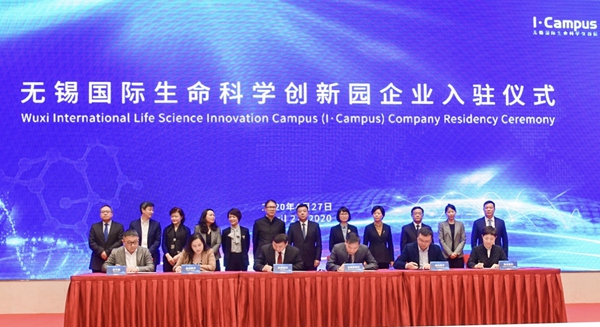Int'l pharma set up bases in east China
- By Zhang Jiaqi
 0 Comment(s)
0 Comment(s) Print
Print E-mail China.org.cn, April 29, 2020
E-mail China.org.cn, April 29, 2020
To tap into the potential of the life science industry in China, international pharmaceutical companies clustered in a life science innovation campus based on Sino-foreign cooperation in the city of Wuxi in east China.

The 300,000-square-meter industrial park I·Campus, known as Wuxi International Life Science Innovation Campus, was jointly established by the Wuxi municipal government, Wuxi National High-Tech District, and the pharmaceutical giant AstraZeneca in September last year.
AstraZeneca China Vice President Tina Xu said that, amid the outbreak, life science is in the spotlight worldwide, and the new normal of dealing with the virus made medical innovation, digital medicine, and global cooperation important tasks around the world. The pandemic is highlighting the importance of the global coordination, she said.
On April 27, 10 companies from countries and regions such as Japan and India, officially set up operations here, bringing the total number of registered companies on the campus to 17.
According to Tina, the platform constructed based on Sino-foreign cooperation will not only help to ratchet up health science innovation and commercialization in the country, but also tap into the potential of attracting overseas players to co-build an industrial ecosystem.
"The friendly incubation environment of I·Campus and favorable policies of the Wuxi municipal government will empower the successful launch of our programs in China market," said David O'Dell, vice president of Tricog China, an Indian healthcare artificial intelligence company among the 10.
Xu Yi, general manager of Teddy Clinical Research Laboratory, also shared why her company chose the east China platform. She said that, with the help of I·Campus, her company will be able to achieve high-speed development.
Xu explained that the local government has provided an open and inspiring business environment for innovative companies, and the platform co-builder AstraZeneca is also sharing its global resources and offering commercial support, which made her feel very confident in the future.
She added that her company specialized in medicine and healthcare can bring services of complementary nature to the ecosystem, while enjoying the benefits of operating here.

To attract companies on the platform, the local government has not only offered favorable policies and subsidies involving research and development, taxation, and so on, but also established a green channel that helps to accelerate the application and approval process for resident companies to bring new products to the Chinese market.
Tina said that AstraZeneca has had firsthand experience of China's continuously improving environment for innovation and entrepreneurship as well as the increasingly higher vitality in the market over recent years before the outbreak. Having been rooted in the Chinese market for 27 years, the multinational's Chinese establishments headquartered in Shanghai have set up a research and development center in the municipality, and production bases in Wuxi, and Jiangsu's Taizhou. Now, the U.K.-based transnational corporation has become one of the largest pharmaceutical companies in China.
"The 'go digital' trend and new technologies brought changes to the industry and offered opportunities for companies to develop," she said, adding that I·Campus will strive to accelerate healthcare innovation in China by bringing together innovative drug, device, diagnosis, and digital companies, government, and medical and academic institutions via its open collaboration platform. As planned, the hub aims to bring in over 50 innovative firms in three years and 100 within five years.
Looking into the future, Tina said she is full of confidence in the Chinese market.
"Despite short-term impacts of the outbreak, the Chinese economy showed its great resilience, and the whole industry has a bright future," she said.
Zhu Xiaohong, deputy head of the managing committee of Wuxi National Hi-tech District, shared similar expectations, adding that the life science industry now develops at a high speed and is a very promising industry with a great potential.
In 2016, China outlined a new long-term public health initiative called "Healthy China 2030." In September 2017, a whitepaper on the development of China's public health was released, estimating that the monetary value of the health service industry in the country would be over 8 trillion yuan by 2020 and 16 trillion yuan by 2030.
Last year, China's State Council issued a guideline for implementing the country's "Healthy China" initiative and promote people's health, proposing 15 special health campaigns. An action plan for 2019-2030 was also rolled out, specifying objectives and tasks of each campaign, as well as responsibilities of different actors in the campaign.
"The new round of scientific and technological revolution and business model transformation of the medical and health industry are well underway globally, also creating opportunities for Chinese medical and health market to make breakthroughs in its development," Tina said, adding that the trend has been accelerated by the COVID-19 outbreak.






Go to Forum >>0 Comment(s)